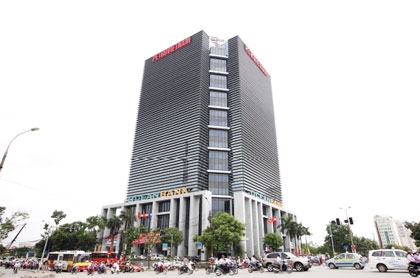Greater controls for the budget?
 |
| Vietnam’s state giant wield enormous power in the local business world |
National Assembly (NA) deputy Tran Du Lich said the legislative body could not keep close control of the government’s expenses, though it was in charge of supervising the country’s important spendings, due to a lack of reported detailed expenses.
He said there were too many loopholes in the government’s supervision over projects using state capital and over state-run groups and corporations’ operational and capital use effectiveness.
According to a NA Standing Committee report, up to December 31, 2008, the total capital volume of Vietnam’s 90 state groups and corporations was VND1,241 trillion ($68.944 billion), equivalent to 83.45 per cent of Vietnam’s gross domestic product (GDP) in 2008. However, almost half of these state giants were ineffectively operating.
“Why have there been no more clear results of the government’s inspections and examinations of state-run groups and corporations’ operational and capital use effectiveness, though many investigations have been launched?” Lich said.
He attributed the situation to giant corporations’ financial reports being problematic, thus making auditing of such reports troublesome.
“The NA needs to devise a resolution requiring state groups and corporations to publicise their financial reports as other companies do in the security market, so that the public and constituents can easily keep close control of state firms and equality between types of enterprises can be ensured,” Lich said.
Bac Ninh province’s NA deputy Phuong Huu Viet said that state groups’ investment performance and profits remained unclear.
“For example, state-owned enterprises only reported their total revenues over the first nine months of the year, not details for such revenues,” Viet said.
According to Danang city’s NA deputy Nguyen Ba Thanh, a more effective mechanism to control the government’s state budget expenses needed to be worked out.
“Many other countries stipulate the limit for their governments to use state-budget. If the expenses are bigger than the limit, the governments have to report to their national assemblies,” Thanh said.
The NA’s Finance and Budget Committee recommended that the government clearly report specific lists of projects using state budgets to the NA, specific capital for each project implemented by state groups. Moreover, such projects also needed to be put up for open bidding to ensure equality among all economic sectors.
“We also recommend that the government explain all of its expenses to state groups,” said the NA Standing Committee’s chairman Phung Quoc Hien.
A governmental report stated that the government’s total expenditure in 2010 was about VND637.2 trillion ($33.536 billion), up 9.5 and 9 per cent against initial estimations and 2009’s disbursed sum, respectively.
But, the committee said that the big excess in expenditure had belittled the significance of the state budget estimation and approval, and that it reflected a fact that the government’s obedience of the discipline in expenditures remained quite lax.
“We recommend that the government clearly explain the expenditures and the causes of the state budget overspending,” Hien said.
The committee also asked the government to reduce the state overspending rate from 5.95 per cent of GDP as initiated by the government to 5.5 per cent of GDP in 2010. This would lay a firm foundation for the government to gradually reduce overspending rate to 5 per cent of GDP in between 2009-2013 and lower during the following years.
What the stars mean:
★ Poor ★ ★ Promising ★★★ Good ★★★★ Very good ★★★★★ Exceptional
Related Contents
Latest News
More News
- Vietnam’s green transition demands collective financial action (December 15, 2025 | 12:00)
- VIR workshop highlights capital and policy for sustainable development (December 15, 2025 | 11:00)
- Promoting digital assets initiative in Vietnam (December 13, 2025 | 09:30)
- Experts flag gaps as national financial strategy under review (December 12, 2025 | 15:13)
- Global gold exchange models offer roadmap for Vietnamese market (December 12, 2025 | 11:58)
- Five million household businesses to adopt self-declared tax system (December 11, 2025 | 18:13)
- Vietnam establishes management board for crypto asset trading market (December 11, 2025 | 18:11)
- ACB offers financing to fit Vietnam’s textile and garment industry (December 11, 2025 | 09:07)
- Vietnam accelerates push for open banking (December 10, 2025 | 11:58)
- Reshaping the country’s digital finance sector (December 09, 2025 | 21:12)

 Tag:
Tag:






















 Mobile Version
Mobile Version